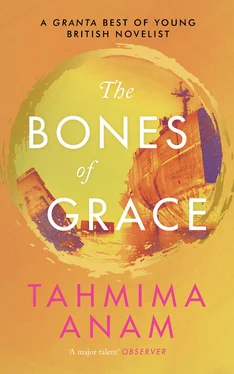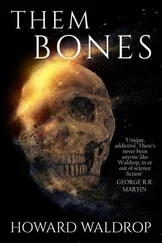‘Fossils! You know, Elijah’s great-great-great-grandfather was the original Indiana Jones.’
Of course he was. I looked around me now, at all the people in black dresses and suits. On a sofa that faced the garden, three men who looked almost identical to each other and to you were crowded together, playing Scrabble. They must be your brothers. I realised I didn’t even know which one you were in order of age, but, even as I asked myself the question, I knew you must be the youngest. Ezekiel, Erasmus, and Eric. Hello. Hello. Even sitting, they were almost as tall as me. Their teeth gleamed in their faces. No one had asked me if I wanted anything to eat, so when you let go of my hand and moved towards the piano, I made my way to the table and found mismatched casserole dishes, pie plates, and baking trays holding lasagna, cold salads, cheeses, and sticks of vegetables. There was an open bottle of wine on the sideboard and a woman pouring herself a glass asked me if I wanted any.
A loud, rhythmic tune exploded from the piano. ‘Thelonious Monk,’ you called out above the crowd, ‘Grandma’s favourite.’
‘Oh, stop that now. Play something with a tune,’ someone said, but the crashing jazz continued. The woman who had offered me a glass of wine now asked, ‘Where are you from?’ She had a milky, freckled face and a beautiful mouth, her long hair pulled into a French braid.
‘Bangladesh,’ I said, then realised she was asking how I came to be there. ‘I’m a friend of Elijah.’
‘You know, my grandma once made us watch a documentary about Bangladesh. And we spent the next few weeks chanting “Joy Bangla”.’
‘That’s something of a national slogan.’
‘Grandma was an old leftie.’
‘You must be Elijah’s sister.’
‘That’s right. Ada.’
When she leaned down and hugged me, I wanted to cry.
‘I recommend the tuna casserole. My mother is a terrible cook.’
In the meantime, you had started to sing. ‘Imagination is funny/It makes a cloudy day sunny.’
Ada joined in, with a strong, practised voice. ‘Makes a bee think of honey.’ She led us to the piano and then you were sitting side by side on the stool. Others circled you, and the chorus of voices was sweet and loud.
I stepped back, holding the plate of tuna casserole, watching your back sway to the music, and then I drifted away, down a corridor and past a pair of swinging doors into the kitchen. I found the countertops worn and scrubbed, the whole place smelling of old trees. I leaned against the wood-burning stove for a moment, enjoying its warmth even on this very hot day, before examining the photographs on the fridge. A collage of willowy, beautiful people smiled indirectly at the camera, holding dogs and babies against backdrops of mountains and dark lakes. I opened the fridge and found an open tin of cat food and a jug of lemonade crowded with spears of fresh mint.
The song had finished. I liked how no one noticed as I came and went. When I went back inside, a wave of warm air swirled through the room, the smell of lavender drifting in from outside and settling on the furniture. I saw, then, that there was a large portrait of your grandmother displayed on a side table. Someone had pencilled her features, a strong jaw and wide-apart eyes and a pair of dark-rimmed glasses. She wore a small smile, as if she had just seen someone she knew and was about to wave hello. Beside the drawing there was a notebook on which people were writing messages. I looked closer. May you be as treasured above as you were among us . And: Tell God it’s getting hot down here! And: Grandma, as you left the planet, you sent me a gift. Thank you .
A few people carried plates into the kitchen and I heard the sound of water running. I found your mother reclining on the sofa. The sun zigzagged against her face. Your brothers were outside, huddled together beside an old swing set. In a gazebo at the back, I spotted Autumn sitting on her own, and I wondered if I should go and talk to her. A man was narrating a story about how Clementine had crashed his parents’ wedding dressed as a camel. I watched you as you listened to the story — you had obviously heard it before — and I wondered what it was like to be so sure of your provenance, to talk about ancestors whose lives were documented, birth certificates and university degrees and marriages officially registered. To be told a straight story that you knew was true. Me, I couldn’t look at another living person and see something of myself, the angle of eyes, a gait, a particular texture of hair, or identify the things I hated about myself, the smallness of my breasts, the weakness of my ankles. The kink in my hair had no echo. In a culture where people commented freely on everyone’s looks, people rarely said anything about mine, because a simple phrase, ‘how beautiful you are’, couldn’t be followed by, ‘just like your mother’. Just like who? To whom did these long bones belong, the tone of my skin? Not to the ancestors collaged onto my history.
I laughed with everyone else as the man described the look of shock on his parents’ faces, the judge at the registrar’s office standing up and ordering them to leave.
‘We should go,’ you said, appearing behind me. You had changed into shorts and a red T-shirt with Chinese lettering on the front. ‘Zubaida has things to do.’
‘I didn’t get to say a proper hello,’ your mother said, pulling her glasses from on top of her head.
‘I’m leaving in a few days,’ I said.
‘Well, that’s a shame.’ Your mother put her hands on my shoulders and regarded me, and I wanted to ask her if I could stay, to walk up the stairs and fold myself into the blankets on her bed. ‘Here,’ she said, as if reading my mind, ‘take this.’ And she pulled a necklace over her head and then over mine. It was made of old buttons, each one a slightly different shade of blue. I kissed her on the cheek and said goodbye. Outside, a pair of brown cats had draped themselves on the porch. The air was packed tight in the heat, everything quiet and solemn.
Meeting your family changed something between us. I saw the way you wrestled with your brothers, punching them on the arm by way of hello, and how everything was so perfectly dishevelled in your house. And I could imagine almost every day of your childhood, because it would have been documented in films or on television — in that way, you had probably lived a deeply unremarkable life, had experiences without specificity, and that had bothered you, the way my own past grated at me. All the things that irritated you were things that I had longed for, and all the things you longed for were things I took for granted. I fingered the necklace your mother had given me. It was so light around my neck I could hardly feel it, and I sought that, that lightness and impermeability, things passed from person to person with little significance.
‘I was Clem’s favourite,’ you said, in answer to my question. ‘I’m going to miss her.’
‘Was your father there?’
‘I didn’t want to overwhelm you.’
I was suddenly hungry. You suggested we return to Harvard Square and have lunch. We debated the merits of Felipe’s and Chipotle’s, both of which I had frequented over the years and would miss, and at that point I remembered I had left my suitcase at your house and I stopped in a rectangle of shade, asking if we could go back.
You told me to wait there, and jogged backwards. A few minutes later you were wheeling the suitcase down the street. When you stopped I closed my eyes and I thought you might kiss me lightly and tenderly on the forehead, as if you had been kissing me for years, as if we had lived together in a house and raised children and frowned over the sagging roof and made French toast on Sundays.
Читать дальше












